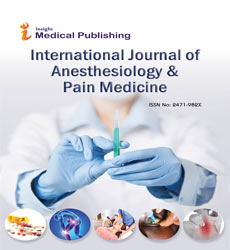Perspective on Clinical Complications of Depression
Gilda Cinnella
DOI10.36648/2471-982X.21.7.33
Gilda Cinnella*
Department of Anesthesia, University of Bologna, Cesena, Forlì, Italy
- *Corresponding Author:
- Gilda Cinnella
Department of Anesthesia
University of Bologna
Cesena, Forlì, Italy
E-mail: gildacinnella@uni.it
Received Date: February 15, 2021 Accepted Date: March 1, 2021 Published Date: March 8, 2021
Citation: Cinnella G (2021) Perspective on Clinical Complications of Depression. Int J Anesth Pain Med Vol.7 No.2:33
Description
It can be defined as a mood disorder. Misery is delegated a temperament issue. It could be depicted as sensations of bitterness, misfortune, or outrage that meddle with an individual's regular exercises. Individuals experience misery in an unexpected way. It might interpose into your day by day work, bringing about lost time and lower efficiency. It can likewise impact connections and some persistent medical issue.
Types of Depression
Wretchedness can be broken into classes relying upon the seriousness of manifestations. A few people experience mellow and brief scenes, while others experience extreme and continuous burdensome scenes.
Major depressive disorder
It is the more severe form of depression. It’s characterized by persistent feelings of sadness, hopelessness, and worthlessness that don’t get away on their own. In order to be diagnosed with depressive disorder, you must experience 5 or more subsequent symptoms over a 2-week period:
• Feeling discouraged the greater part of the day
• Loss of interest in most customary exercises
• Critical weight reduction or gain
• Resting a great deal or not having the option to rest
• Eased back reasoning or development
• Weakness or low energy most days
• Sensations of uselessness or blame
• Loss of fixation or uncertainty
• Repeating musings of death or self-destruction
Persistent depressive disorder
It is used to be called dysthymia. It's a milder, yet persistent, type of sadness. All together for the determination to be made, side effects should keep going for in any event 2 years. PDD can influence your life more than significant melancholy since it goes on for a more drawn out period.
It's regular for individuals with PDD to:
• Lose interest in typical day by day exercises
• Feel miserable
• Need efficiency
• Have low confidence
Sorrow can be dealt with effectively, however it's imperative to adhere to your treatment plan.
Signs
• hopeless outlook
• lost interest
• increased fatigue and sleep problems
• anxiety
• irritability in men
• changes in weight and appetite
• uncontrollable emotions
• looking at death
Diagnosis
1. Actual test: Your PCP may do an actual test and pose inquiries about your wellbeing. Now and again, melancholy might be connected to a hidden actual medical condition.
2. Lab test: For instance, your primary care physician may do a blood test called a total blood tally or test your thyroid to ensure it's working appropriately.
3. Mental assessment: Your emotional well-being proficient gets some information about your indications, musings, sentiments and personal conduct standards. You might be approached to round out a poll to help answer these inquiries.
4. DSM-5: Your psychological well-being proficient may utilize the models for discouragement recorded in the Diagnostic and Statistical Manual of Mental Disorders (DSM-5), distributed by the American Psychiatric Association.
Treatment
Medication
• Selective Serotonin Reuptake Inhibitors (SSRIs): SSRIs include citalopram, escitalopram (Lexapro), fluoxetine (Prozac).
• Serotonin-Norepinephrine Reuptake Inhibitors (SNRIs): Ex: duloxetine, venlafaxine.
• Atypical antidepressants: Ex: bupropion, mirtazapine
• Tricyclic antidepressants: These drugs-such as imipramine, nor triptyline
• Monoamine Oxidase Inhibitors (MAOIs): MAOIs-such as tranylcypromine, phenelzine and isocarboxazid—may be prescribed, typically when other drugs haven't worked, because they can have serious side effects.
• Different prescriptions: Doctor may suggest joining two antidepressants or adding meds, for example, disposition stabilizers or antipsychotics. Hostile to nervousness and energizer prescriptions likewise could likewise be added for momentary use.
Other treatments
• Psychotherapy
• Hospital and residential treatments
• Electro Convulsive Therapy (ECT)
• Transcranial Magnetic Stimulation (TMS).
Open Access Journals
- Aquaculture & Veterinary Science
- Chemistry & Chemical Sciences
- Clinical Sciences
- Engineering
- General Science
- Genetics & Molecular Biology
- Health Care & Nursing
- Immunology & Microbiology
- Materials Science
- Mathematics & Physics
- Medical Sciences
- Neurology & Psychiatry
- Oncology & Cancer Science
- Pharmaceutical Sciences
